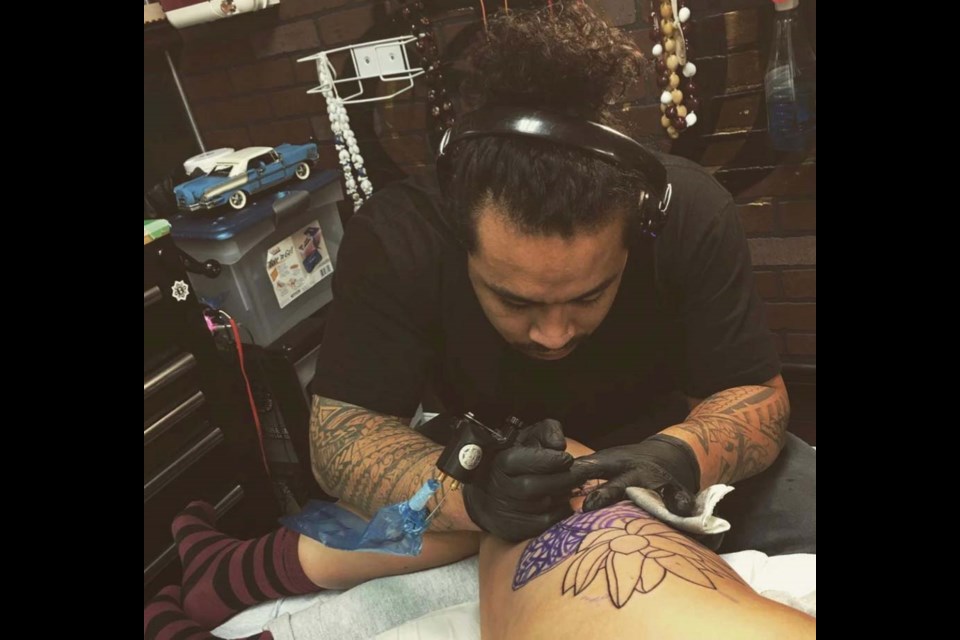Fitu Taefu got his first tattoo at 12 years old.
But it wasn’t an act of juvenile rebellion.
In fact, his family was there when he got the tattoo.
That’s because in Samoan culture, tattooing is a rite of passage for adolescent boys, representing the transition into manhood.
And Taefu knows the practice well. He comes from a long line of Tufuga, the name for Samoan tattooists.
He started learning the art at just seven years old, working alongside his uncle, who Taefu helped by stretching the skin of tattoo recipients, preparing it to be punctured by tools made of bone, and ink made from the soot of burned candlenut.
His first tattoo? A black armband of geometric shapes and zig-zags, symbolizing his status as the son of a matriarch and a high chief in his Samoan community.
Now Taefu is bringing traditional Polynesian tattoos and tattooing methods to St. Albert at the city's first 100 per cent Indigenous-owned tattoo studio and possibly the first studio in Canada to offer tattoos done using the hand-tapping method practiced by Polynesian cultures.
The studio is called Tatau Le Toa, which means “Tattoo the Strong” in Samoan. It’s appropriate given that enduring the pain of a hand-tapped tattoo requires a large supply of inner strength, according to Taefu. One the tattoos’ many cultural meanings is that they are a way for men to empathize with the pain of childbirth.
“My experience with people here, yeah, they cry,” Taefu said.
But the tears aren’t only from pain, Taefu has found. They are also tears of catharsis.
Unlike most tattoo artists, who get direction from customers about the specifics of a tattoo design, Taefu uses the material of his customers’ lives to create his art. He asks them about their desires, their family histories, their life trajectories and more before he takes a sharpie to their skin and begins to draw the intricate patterns.
Each design is bespoke — the shapes and patterns fitted to the recipients’ unique life circumstances, and Taefu has the freedom to get creative. The process requires trust, he said. For example, a tattoo for someone who aspires to be a powerful political leader would inspire Taefu to design something with spearheads, as they represent authority and power in his culture.
Hand-tapped work also takes longer to finish than tattoos done using a machine.
The Tufuga dips a needle into ink, attaches it to a wooden tool, and repeatedly taps the needle into the skin using a striking stick.
But at Tatau Le Toa, the work isn’t done with bones and the soot of candlenut.
“Obviously, now we use sterile, single-use needles,” he said.
Taefu’s body is covered with traditional Polynesian tattoos — patches of black; straight, jagged and curved lines; circles, triangles and rectangles. The lines reflect natural landscapes: ocean waves, mountain lines, tree lines and forest lines.
They also follow the body’s natural lines and muscle groups
But the designs are purely non-ornamental — they have very specific meanings.
“The canoe on my back represents the journey of my people [through the South Pacific],” he said. “And then the rafters on the side [of my back] represent the chief’s house, the connection to my mom and my dad's side of the families. And the most important one is the bellybutton. It’s the last bit that's been tattooed. It's to break off the bond between me and my mom. It's like a spiritual umbilical cord — once that is tattooed, I'm ready to go out into the world to become a man.”
Taefu compared Polynesian tattoos to a passport. Polynesian societies use tattoos to signify where they come from, their family connections and their roles in society.
His studio is expected to open on Saturday. It is opening at a time when traditional Indigenous tattooing is gaining steam as Indigenous people worldwide reclaim their cultures.
It’s also opening at a time when there is greater awareness about cultural appropriation — the dominant culture taking and using elements of another, often historically oppressed, culture without understanding the significance of those artefacts.
Taefu gets asked regularly whether it’s okay for a non-Polynesian people to get the tattoos.
He said Polynesian cultures were tattooing outsiders even before European contact. There are specific motifs, lines and forms they developed to be used only on non-Polynesians.
Taefu knows these designs, and he can create tattoos made for outsiders that are respectful of Polynesian cultures.
Taefu said that for him Tatau Le Toa Inc. is all about carrying on his family’s legacy. He started the studio with the help of his parents, who live in Aoteroa, also known as New Zealand, and all three of his daughters are curious about the art form.
As he expands his studio in St. Albert, he expects that his family will only get bigger.
“When I tattoo someone, they automatically become a friend or a family member to me,” he said. “They’re wearing something that represents them, but it's also a part of my culture.”




